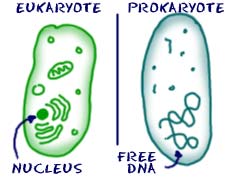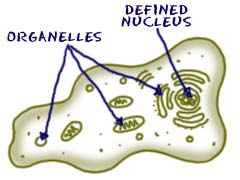
The Littlest Organisms
Let's study the wee ones of the world known as the microbes or the microorganisms. If you spend your life studying them, you would be a microbiologist. These are the smallest of the small and the simplest of the simple. Some of them, like viruses, may not even be alive as we currently define life.
Eukaryotes - Cells with Parts
 This is the place to learn about cells with a nucleus and all sorts of organelles. Eukaryotes are what you think of when you think of a classic "cell." There are cells without organized nuclei or organelles that are called prokaryotes, but not on this page.
This is the place to learn about cells with a nucleus and all sorts of organelles. Eukaryotes are what you think of when you think of a classic "cell." There are cells without organized nuclei or organelles that are called prokaryotes, but not on this page.
The possibilities are endless. Eukaryotes are cells that can do anything. They are the cells that have helped organisms advance to new levels of specialization beyond imagination. You wouldn't be here if eukaryotic cells did not exist. What makes a eukaryotic cell? Let's watch.
 (1) Eukaryotic cells have an organized nucleus with a nuclear envelope. They have a "brain" for the cell. They have a discreet area where they keep their DNA. It is also said that they have a "true nucleus." Can we say it any other way?
(1) Eukaryotic cells have an organized nucleus with a nuclear envelope. They have a "brain" for the cell. They have a discreet area where they keep their DNA. It is also said that they have a "true nucleus." Can we say it any other way?
(2) Eukaryotic cells usually have organelles. They might have mitochondria, maybe a chloroplast, or some endoplasmic reticulum. They have parts that work to make the cell a self-sufficient organism.
(3) Although limited in size by the physics of diffusion, eukaryotic cells can get very large. There are even some extreme examples called plasmodial slime molds that can be a meter wide. The cell is multinucleated (many nuclei) and it gets huge. Generally, eukaryotic cells are a couple hundred times the size of a prokaryotic cell.
(4) Eukaryotic cells have extra stuff going on and extra parts attached. Since they have organelles and organized DNA they are able to create parts. One example is the flagellum (a tail-like structure to help it move). They could also create cilia (little hairs that help scoot the cell through the water). In the invertebrate section, we talk about nematocysts that are cells with little harpoons for catching prey. The list is endless.
► NEXT PAGE ON MICROORGANISMS
► NEXT STOP ON SITE TOUR
► RETURN TO TOP OF PAGE
► Or search the sites...
► NEXT STOP ON SITE TOUR
► RETURN TO TOP OF PAGE
► Or search the sites...
Related Video...
The Ocean’s Green Machines (NASA/GSFC Video)
Encyclopedia.com:
http://www.encyclopedia.com/topic/eukaryote.aspx
Wikipedia:
http://en.wikipedia.org/wiki/Eukaryote
Encyclopædia Britannica:
http://www.britannica.com/EBchecked/topic/340003/life/279352/Diversity?anchor=ref320836



